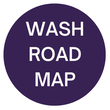© Vincent Ghilione / SOLIDARITES INTERNATIONAL
WHAT IS THE WASH Road Map?
In 2019, humanitarian assistance reached a global peak, with the water, sanitation, and hygiene (WASH) sector playing a central role in emergency response efforts. However, despite its critical importance, WASH responses have often fallen short of established humanitarian or sectoral standards due to capacity, preparedness, and funding limitations. This has led to services and assistance that are not fully accountable and fail to address the priority needs of affected populations.
Now is the time to take decisive action to strengthen the capacity of the WASH sector. By prioritizing preparedness and resilience across the humanitarian-development continuum, we can ensure high-quality, accountable responses to emergencies. Adopting a risk-informed approach allows us to build resilience and mitigate the impacts of emergencies, while also addressing broader challenges such as climate change and environmental protection.
Innovative, predictable, and flexible multi-year funding mechanisms are essential to maximizing gains and achieving the ambitious targets set by the Sustainable Development Goals (SDGs) in the WASH sector.
Through collective commitments and strategic engagement, we can implement the WASH Road Map, which offers innovative approaches to saving lives, improving public and environmental health outcomes, and fostering synergies between acute emergencies and long-term development.
Explore this website to learn about our 8 initiatives, their activities, progress, co-leads, and more. If you're inspired by our collective vision and strategy, we invite you to join us in this collaborative effort to build resilience and enhance WASH outcomes worldwide.
Now is the time to take decisive action to strengthen the capacity of the WASH sector. By prioritizing preparedness and resilience across the humanitarian-development continuum, we can ensure high-quality, accountable responses to emergencies. Adopting a risk-informed approach allows us to build resilience and mitigate the impacts of emergencies, while also addressing broader challenges such as climate change and environmental protection.
Innovative, predictable, and flexible multi-year funding mechanisms are essential to maximizing gains and achieving the ambitious targets set by the Sustainable Development Goals (SDGs) in the WASH sector.
Through collective commitments and strategic engagement, we can implement the WASH Road Map, which offers innovative approaches to saving lives, improving public and environmental health outcomes, and fostering synergies between acute emergencies and long-term development.
Explore this website to learn about our 8 initiatives, their activities, progress, co-leads, and more. If you're inspired by our collective vision and strategy, we invite you to join us in this collaborative effort to build resilience and enhance WASH outcomes worldwide.

